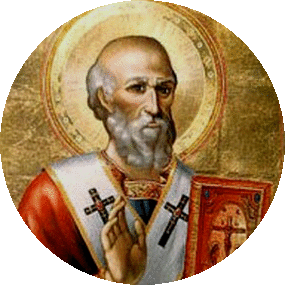
2 May
St Athanasius (died 373)
Bishop & Doctor
Born c. 296–298, Alexandria, Roman Egypt
Died 2 May 373 (aged 75–78), Alexandria, Roman Egypt
Language Coptic, Greek
Tradition or movement
Nicene Christianity
Trinitarianism
Notable ideas: Consubstantiality, Trinity, divinity of Jesus, Theotokos
St. Athanasius, Bishop of Alexandria and a great defender of the orthodox faith, throughout his life opposed the Arian heresy. By denying the Godhead of the Word the Arians turned Christ into a mere man, only higher in grace than others in the eyes of God.
St. Athanasius took part in the Council of Nicea in 325 and until the end remained a champion of the faith as it was defined by the Council. In him the Church venerates one of her great Doctors. He was subjected to persecutions for upholding the true teaching concerning the person of Christ and was sent into exile from his see no less than five times. He died at Alexandria in 373 after an episcopate of forty-six years.
COLLECT PRAYER
Almighty ever-living God, who raised up the Bishop Saint Athanasius as an outstanding champion of your Son’s divinity, mercifully grant, that, rejoicing in his teaching and his protection, we may never cease to grow in knowledge and love of you. Through our Lord Jesus Christ, your Son, who lives and reigns with you in the unity of the Holy Spirit, God, for ever and ever.
Things to Do
If you are feeling academic you might like to read Ecclesiastical History by Salaminius Hermias Sozomenus.
St. Athanasius
A champion of orthodoxy! He did not die a martyr, but his life was martyrdom in the truest sense. Athanasius was the Church’s greatest hero in the battle against Arianism (a heresy that denied Christ’s divinity). Even as a young deacon at the Council of Nicea (325), he was recognized as “Arius’ ablest enemy” and the foremost defender of the Church’s faith. After the death of his bishop (328), “the entire Catholic congregation with one accord, as one soul and body, voiced the wish of the dying bishop Alexander that Athanasius should succeed him. Everyone esteemed him as a virtuous, holy man, an ascetic, a true bishop.”
There followed fifty years of constant conflict. Under five emperors and by exile on five different occasions, he gave testimony to the truth of the Catholic position. His allegiance to the Church never wavered, his courage never weakened. As consolation in the face of horrendous calumnies and cruel persecution, Athanasius looked to the unwavering love of his Catholic people. Even time brought no mitigation in Arian hatred. For five years he hid in a deep, dry cistern to be safe from their raging wrath and their attempts to assassinate him. The place was known only to one trusted friend who secretly supplied necessary food.
That Athanasius enjoyed God’s special protection should have been obvious to all. On one occasion when the emperor’s assassins were pursuing him, Athanasius ordered the ship on which he was fleeing to double-back and sail upstream so that he might meet and by-pass his persecutors. Not recognizing the boat upon meeting in semi-darkness, they naively asked whether the ship carrying Athanasius was still far ahead. Calmly and truthfully Athanasius himself called back, “He is not far from here.” So his persecutors kept sailing on in the same direction, allowing the saint to complete his escape.
Preserved by divine Providence through a lifetime of trial and danger, he finally died in his own quarters at Alexandria during the reign of the Emperor Valens (373). Athanasius enriched Christian literature with many important works, some pointed toward piety and edification, others polemical and dogmatic in nature. He ruled the Church of Alexandria for forty-six years.
— Excerpted from Saints of the Roman Calendar by Enzo Lodi
Source: CATHOLIC CULTURE